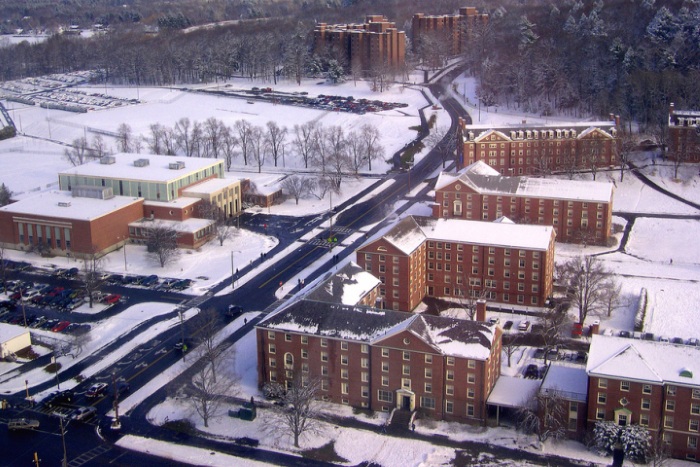To avoid violating US sanctions against Iran, the University of Massachusetts at Amherst previously published a policy stating that it would no longer accept Iranian nationals into graduate programs in electrical, computer, chemical and mechanical engineering, or any of its natural science courses.

News of this decision went viral and a few days later, the University opted to reverse its stance, saying that rather than ban all persons of Iranian descent from its engineering and science courses, it would instead work to develop individualized study plans to meet the requirements of federal sanctions law and address the impact on students.
To give this story some context, University officials – when originally defending their decision – cited a US Department of Homeland Security policy based on a 2012 federal law that states Iranian citizens may not be granted US visas if they seek higher education in preparation for a career in Iran’s energy sector or any field related to nuclear power.
The law was passed while the United States and other nations were in the process of establishing restrictions on Iran’s nuclear program. Iran defended the program saying it was for civilian purposes, but some countries worried it was seeking to build a nuclear arsenal.
UMass’s decision to follow-up on this particular sanction in 2015 drew sharp criticism, including from some Iranian students already in the University's graduate programs.
“We feel that it’s against the American spirit of freedom in education,” said Amir Azadi, a member of UMass’s Iranian Graduate Students Association, which he said has about 60 members.
When contacted about the matter, a US State Department official said the branch was unaware of the UMass decision, but did point out that there had been no changes in federal policy regarding Iranian students.
“All visa applications are reviewed individually in accordance with the requirements of the US Immigration and Nationality Act and other relevant laws that establish detailed standards for determining eligibility for visas and admission to the United States,” the official, who declined to be quoted by name, said in an e-mail to the Boston Globe. “US law does not prohibit qualified Iranian nationals coming to the United States for education in science and engineering,” he continued. “Each application is reviewed on a case-by-case basis.”
News of the University’s decision to ban Iranian students came to light when a student from that country inquired about the policy. To clarify the matter, the school formalized it and published it online, stating that it wanted to make its rules clear and to protect students, faculty, and fund sources from disruptions to research caused when current students are delayed or prevented from reentering the country because of visa issues.
The statement read:
The University has determined that recent governmental sanctions pose a significant challenge to its ability to provide a full program of education and research for Iranian students in certain disciplines and programs. Because we must ensure compliance with applicable laws and regulations, the University has determined that it will no longer admit Iranian national students to specific programs in the College of Engineering (i.e., Chemical Engineering, Electrical & Computer Engineering, Mechanical & Industrial Engineering) and in the College of Natural Sciences (i.e., Physics, Chemistry, Microbiology, and Polymer Science & Engineering) effective February 1, 2015.
“We don’t like it,” Mike Malone, UMass’s vice chancellor for research and engagement. “We’d rather have free access, but we consulted with the law and with outside counsel on this.”
The policy included an acknowledgement that “the exclusion of a class of students from admission directly conflicts with our institutional values and principles,” but that it was developed “reluctantly” and after consultation with faculty and graduate students.
“We totally understand the concern of UMass that Iranians should not pursue any research in nuclear energy, in those fields mentioned in the law,” said Azadi, a doctoral student in theoretical physics who studies the formation of crystalline structures. “We just want UMass not to generalize all the Iranians.”
Malone said that the administrators at UMass believed the school was in the mainstream of American institutions in having such a policy and that they were just one of the first ones to have published it.
Trita Parsi, president of the National Iranian American Council, said it was “not aware of any other universities that have announced it” but admitted that others probably have quietly developed similar policies. “There are undoubtedly other universities that have misinterpreted the law,” he added.
UMass’s policy would have also affected currently enrolled Iranian students, as they were going to be required to “acknowledge the restrictions imposed by the 2012 sanctions and certify their compliance in writing,” according to a statement posted online.
In reversing their decision, Malone — for the most part — admitted the University made a mistake: “This approach reflects the university’s longstanding commitment to wide access to educational opportunities,” he said. “We have always believed that excluding students from admission conflicts with our institutional values and principles. It is now clear, after further consultation and deliberation, that we can adopt a less restrictive policy.”
Via Boston Globe
Advertisement
Learn more about Electronic Products Magazine





